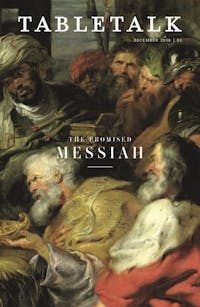
Request your free, three-month trial to Tabletalk magazine. You’ll receive the print issue monthly and gain immediate digital access to decades of archives. This trial is risk-free. No credit card required.
Try Tabletalk NowAlready receive Tabletalk magazine every month?
Verify your email address to gain unlimited access.
The details and implications of God’s covenant with Abraham are far reaching. Three distinct yet related promises are at the heart of this installment of the covenant of grace: a seed, a land, and a universal blessing. Each of these finds ultimate significance in the Lord Jesus Christ. It is not surprising that Jesus declared that Abraham rejoiced to see His day (John 8:56).
The promise of an offspring or seed is the focal point of God’s promise to Abraham just as it was in the promise that was made to Adam and Eve and that would be made years later to David. The promise of a righteous seed is the thread running through every covenant promise. Admittedly, identifying the seed can be complicated because sometimes it refers to multiple people and sometimes to a single person. First, Abraham’s seed was physical. God promised that Abraham would be a father of many nations (Gen. 17:5). Nations arose from his offspring with Hagar and Keturah, but the seed of promise was Isaac, the son of Sarah. From Isaac came Jacob and then the nation of Israel. The development of this physical seed was essential to the coming of Christ, for He was in the line of Abraham. It was from Israel that Christ came “according to the flesh” (Rom. 9:4–5). There had to be a physical seed if there was going to be God’s Christ. Israel, the particular physical seed of Abraham, was the means to the messianic end of God’s promise.
Second, the seed was and is spiritual. That God promises a seed more numerous than the stars of heaven or the sands of the sea extends beyond Abraham’s physical descendants. Jesus made clear the possibility of being a physical descendant of Abraham without being a spiritual descendant (John 8:39). Similarly, Paul said that not all Israel is Israel (Rom. 9:6–8). The true children of Abraham are those who have faith (Gal. 3:7). Nationality is irrelevant: to belong to Christ is to be Abraham’s true offspring and heirs of the promise (3:29).
Third and most significantly, the ultimate or ideal seed is Christ Himself. Although the word translated “offspring” or “seed” can refer to multiple people as well as to an individual, the form is grammatically singular. Paul focuses on that grammar when he gives his inspired and messianic interpretation of the Abrahamic promise: “It does not say, ‘And to offsprings,’ referring to many, but referring to one, ‘And to your offspring,’ who is Christ” (v. 16). For good reason, the New Testament begins by identifying Jesus both as the son of David and the son of Abraham (Matt. 1:1).

The promise of the land was also a key component in the Abrahamic covenant. It also is both physical and spiritual. The land referred to a real, geographic territory. Yet, the land conveyed a spiritual message beyond geography and borders. It was a symbol or object lesson of the enjoyment of rest in the presence of and in fellowship with God. It is this symbolic sense that points to Jesus as the giver of spiritual rest who reconciles us to God (11:28; Col. 1:22). Just as there was an Old Testament “Jesus” (Joshua) to win physical rest in the land (Heb. 4), so there is the ideal Jesus who leads His people from every age and place into the promised rest. Even the “dirt” of the promised land pointed to the prospect of the spiritual rest possible only through Abraham’s ideal seed. The language of our text that the seed “shall possess the gate of his enemies” simply means that the defenses of the enemies cannot stand against the advancing of the seed. In New Testament language, Christ said that He will build His church and not even the gates of hell can withstand the seed’s advance.
That God would bless Abraham and make his seed a blessing to the entire world brings the focus of the promise directly to Christ. The only thing about the descendants of Abraham that can in any way be construed as a blessing to the entire world is Jesus, the ultimate seed of promise. Paul gave an inspired interpretation of this Abrahamic blessing when he said that Christ became a curse by hanging on the tree so that “in Christ Jesus the blessing of Abraham might come to the Gentiles” (Gal. 3:13–14). This highlights a key messianic theme throughout the Old Testament: the promise of the Messiah was never a uniquely Jewish promise. The only unique claim that Abraham’s physical seed had on Christ was that He came into the world physically through them (Rom. 9:4–5). Abraham’s line was chosen for the physical identity of the Messiah, but all the nations of the earth benefit from the Messiah. The covenant with Abraham narrows our understanding of the promised Seed’s identity while at the same time maintaining the inclusiveness of God’s purpose of grace for “all the families of the earth” (Gen. 12:1–3).
